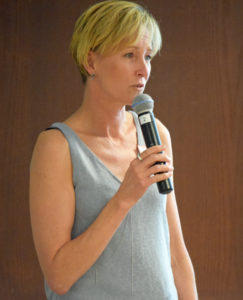CENTENNIAL, CO – On first glance it seemed like everything they’d created after five-plus years of labor and late nights could disappear over a cliff.
Heather Potters was telling a group of eighty entrepreneurs at the Innovation Pavilion in Centennial, Colorado about PharmaJet‘s “regulatory right turn.” Her presentation fit into the TiE Rockies “Catalyzing Innovation” series, a set of talks designed to guide entrepreneurs with advice and wisdom from the trenches. Potters co-founded PharmaJet, a privately-held company that designs and makes a needle-free medical device for injections.
With the calm demeanor of an executive who’s seen it all, Potters described the outcome of the deviation that took hold in the middle of a nationwide device rollout. Her response to the challenge provides a formula for entrepreneurial resilience that especially applies to healthcare startups.
Full steam ahead
Potters started Pharmajet in 2005. A savvy private equity investor, she saw innovating immunization delivery as a path to great return. With worldwide immunization injections numbering about 2.5 billion annually, she also saw an opportunity for “massive global impact.”
Not everyone can stomach a needle, Potters said. According to a survey conducted in Canada, 24 percent of adults and 63 percent of children admitted having needle aversion.
Needle fear can also plague those who administer vaccines.
“Many, many people have come up to me in tears, including pharmacists, saying, ‘I sure wish that I had had this [device],’ because either they had a needlestick and contracted hepatitis, for example, or they are not very comfortable with needles,” said Potters. Needle-free technology eliminates needlesticks, which number up to 800,000 in the U.S. per year with an estimated cost of $3 billion.
With an eye to the U.S. market and abroad, PharmaJet set about developing a reusable, single-dose, self-powered needle-free injector which would eventually focus on immunizations. A key aspect of the technology is the device’s delivery system. A spring-powered injector punctures the skin in one tenth of a second with a precise, pressurized fluid stream inserted at the appropriate depth, whether below the skin or into muscle tissue. According to Potters that accuracy represents a unique advantage. It’s also integral to ensuring a comfortable patient experience.
In 2011 the company glowed with prospects. Then the regulatory right turn arrived.
Lessons from unexpected turns
The genesis of the new requirement had to do with “the FDA’s approach to safety and efficacy confirmations around drugs, vaccines, and devices,” Potters explained, which began to change in 2011. Subsequently, the agency’s policies required PharmaJet to demonstrate its injector method was effectively equivalent to needle and syringe delivery for flu vaccine.
“Our world changed overnight,” Potters recalled.
PharmaJet was the first to undertake this particular study, she added, which involved extensive clinical trials. The process absorbed years of attention and brought on a decrease in the company’s valuation.
But Potters prevailed, relying on personal and business assets for resilience.
She fed on an emotional paycheck drawn on the bank of the “massive global impact” incentive that had spurred her to launch the company and refuse to shelve the product. Additionally, she’d become captivated by the problem of immunization compliance and the company’s needleless technology.
Secondly, she found support in the business ecosystem connected to the product, which included public health officials, customers, funders and vaccine partners. “Had we not had those partners,” she said, “I’m not sure we’d be where we are today.”

Eighty entrepreneurs gathered at the Innovation Pavilion in Centennial, Colorado to hear Potters speak.
Today PharmaJet possesses the only needle-free jet injection technology focused on vaccines and the only such device cleared for intramuscular, intradermal and subcutaneous delivery, Potters said. Thanks to PharmaJet, Americans are getting flu shots without needles. Outside the U.S., the product’s use encompasses polio, MMR and HPV, among other immunizations.
To make all that possible, PharmaJet has raised over $50 million using an ownership structure that resembles a model experts now recommend for startups in healthcare because it suits long development cycles. Potters engaged successful entrepreneurs, friends, and high net-worth individuals and families. But she casts a wide net, speaking with anyone who inquires about the business. “It doesn’t matter how wealthy they are,” she indicated, “because it always leads to something else.”
Finally, the co-founder fashioned advantage from adversity. That study which consumed so much time and energy has become a significant barrier to entry for any new competitor. She turned the often unpopular FDA into a gold-standard partner; together they pursue deep discussions about improving immunization rates.
After the hour-long presentation, Potters discussed these lessons further with a number of entrepreneurs who queued up to speak with her. The conversations, she later acknowledged, generated fuel “to get up every day and keep swinging.”
Like the coverage that CyberMed News provides? Follow us on Twitter, LinkedIn, and Facebook to make sure you keep up to date on the most recent developments in digital health.






Be the first to comment on "A Regulatory Right Turn Becomes a Competitive Advantage for PharmaJet"